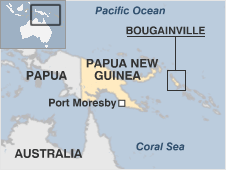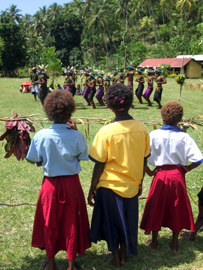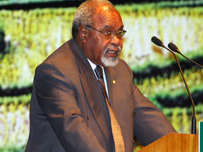Generic Medicines
Taj Pharma is the largest generic pharmaceutical company in India. We hold top positions in different established markets worldwide generics markets..


Some 80% of Papua New Guinea's people live in rural areas with few or no facilities.
Many tribes in the isolated mountainous interior have little contact with each other let alone with the outside world and live within a non-monetarised economy dependent on subsistence agriculture.
A very small proportion of the land can sustain cash crops including coffee and cocoa. Abundant rainforests provide the raw material for a logging industry which is dominated by Malaysian-owned companies. Conservation groups have criticised the social and environmental impact of the activity.
Mineral deposits - including gold copper and nickel - are extensive but the difficult terrain and poor infrastructure make exploitation slow. There are significant reserves of oil and natural gas and the country has pinned its hopes on becoming a significant energy exporter.

Hagen Festival in Papua New Guinea.
|
The separatist struggle in the neighbouring Indonesian province of Papua formerly known as Irian Jaya prompted the flight of thousands of Papuans into Papua New Guinea from the mid-1980s onwards. Many of them remain in border-area jungle camps.
The Port Moresby government has said it will not tolerate the use of Papua New Guinean territory for Papuan separatist attacks on the Indonesian army.
Papua New Guinea had to deal with separatist forces of its own on the island of Bougainville in the 1990s. Up to 20 000 people were killed in the nine-year conflict which ended in 1997.
A peace deal signed in 2001 provided the framework for the election in 2005 of an autonomous government for Bougainville.
Papua New Guinea has strong ties with its southern neighbour Australia which administered the territory until independence in 1975. Canberra's substantial aid programme aims to relieve poverty and to boost development; Australia has also despatched police officers and civil servants to support their local equivalents.
The prevalence of HIV/Aids is on the rise; some experts fear that Papua New Guinea is heading for a crisis similar to that in sub-Saharan Africa.
Head of state: Queen Elizabeth II represented by the Governor-General
Prime minister: Sir Michael Somare
The founding father of independent Papua New Guinea Michael Somare won his second successive term as premier following elections in 2007.

Prime Minister Somare known as "The Chief"
|
This is his fourth term of office.
Affectionately known as "The Chief" Mr Somare led the country to independence from Australia in 1975 and is widely regarded as being untainted by corruption.
He came to power in August 2002 after a violent and chaotic election and in the 2007 polls his National Alliance party won 27 of the 109 parliamentary seats and was invited by the governor-general to form a coalition government. Parliament subsequently elected Mr Somare as prime minister.
His faces several social challenges including crime corruption and rising rates of HIV and AIDS.
In apparent warning to Australia he said after his election: "We will guard the sovereignty of our country we will help our neighbours whenever we can."
Australia Papua New Guinea's biggest aid donor has angered Mr Somare the Solomon Islands and Fiji with its determination to stamp out corruption and crime in the South Pacific and its demands that Fiji return to democracy after a military coup in December 2006.
Radio is an important medium in Papua New Guinea a country with widely-scattered isolated settlements and low levels of literacy.
The government operates a national radio station and a network of provincial stations. Their news coverage is said to be balanced. But funding problems and the non-payment of power bills have taken some of the regional radios off the air.
Television coverage is limited mainly to Port Moresby and the provincial capitals.
Two daily newspapers are foreign-owned. The private press including weeklies and monthlies is active in reporting on corruption and other sensitive matters.
BBC World Service and Radio Australia are available on FM in the capital.
The press
Television
Radio
NAU FM - private commercial

AFRICA | ASIA-PACIFIC | AMERICAS | EUROPE | MIDDLEEAST | SOUTHASIA
![]()
![]()
![]()
Mauritania Mauritius Morocco Mozambique Namibia Niger Nigeria Republic-of-congo Rwanda Sao-tome-and-principe Senegal Seychelles Sierra-leone Somalia South-africa Sudan Swaziland Tanzania The-gambia Togo Tunisia Uganda Australia Brunei Burma Cambodia China East-timor Fiji Indonesia Japan Kazakhstan Kiribati Kyrgyzstan Laos Malaysia Marshall-islands Micronesia Mongolia Nauru New-zealand North-korea Palau Papua-new-guinea Samoa Singapore Solomon-islands South-korea Taiwan Tajikistan Thailand The-philippines Tonga Turkmenistan Tuvalu Uzbekistan Vanuatu Vietnam Antigua-and-barbuda Belize Bolivia Brazil Canada Chile Colombia Costa-rica Cuba Dominica Dominican-republic Ecuador El-salvador Grenada Guatemala Guyana Haiti Honduras Jamaica Mexico Nicaragua St-kitts-and-nevis St-lucia Suriname Trinidad-and-tobago Uruguay Venezuela Albania Andorra Armenia Austria Azerbaijan Belarus Belgium Bosnia-hercegovina Bulgaria Croatia Cyprus Czech-republic Denmark Estonia Finland France Georgia Germany Greece Hungary Iceland Ireland Italy Latvia Liechtenstein Lithuania Luxembourg Macedonia Malta Moldova Monaco Montenegro Norway Poland Portugal Russia San-marino Serbia Slovakia Slovenia Spain Sweden Algeria Egypt Iran Iraq Israel-and-palestinian-territories Jordan Kuwait Lebanon Libya Mauritania Oman Saudi-arabia Sudan Syria Tunisia United-arab-emirates Yemen Afghanistan Bangladesh Bhutan India Nepal Pakistan Sri-Lanka The-Maldive